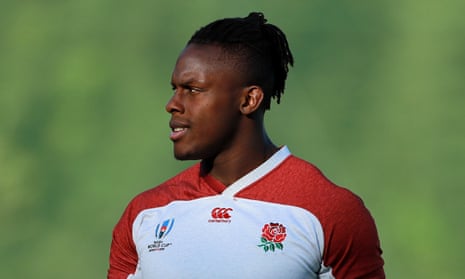England’s Maro Itoje has slammed this week’s racist abuse in football as appalling and abysmal and warned that rugby union should not consider itself immune from similar problems. Itoje says he has teammates who have been the target of abuse and believes the time has come for more black sports people to take a public stand.
The Saracens forward, preparing for the biggest game of his life in the shape of the World Cup quarter-final against Australia on Saturday, has been sickened by events in Bulgaria and is urging rugby to do more to combat racism and discrimination of all kinds.
As a keen football fan Itoje has particular sympathy for the England footballers who were abused during their Euro 2020 qualifier in Sofia on Monday. “It’s just appalling, it’s abysmal,” said the London-born 24-year-old, whose parents hail from Nigeria. “You would think they wouldn’t have to go through that. It sends a poor message about the game of football … it’s a shame because it’s such a beautiful game and it’s being tarred by people with racist thoughts and racist minds.
“It’s terrible that players have to experience that when they just want to go out and play the game they love. It is important that those who are subject to this kind of abuse and discrimination speak up and highlight the wrongs and the issues. I also think associations and teams need to take a tougher stand. Punishment needs to be more severe because it is not acting as a deterrent, especially when they go abroad to places like Bulgaria. They need to make it crystal clear.”
According to Itoje, that is equally the case in rugby. While he acknowledges that “for the most part in rugby there’s a different climate and that kind of stuff doesn’t happen”, he suggests the sport needs to remain vigilant.
“I know people in rugby who have experienced it in the professional game – not necessarily in the Premiership but playing in different parts of the world – and grass roots. In rugby you don’t have microphones everywhere so it’s hard to prove.
“It’s important never to just assume that this is a free zone from any form of discrimination. I think rugby is probably, from the sports I’ve seen, right up there in terms of integrity, respect and how they treat people. But I think it is important to never just assume that it’s always going to be that way. -
“I’m sure, a couple of years ago, when this sort of thing wasn’t as rife in football, they assumed it was all OK. I remember a period when I didn’t really hear much about racism in football but then over the last two years there have been several incidents with Raheem Sterling, Dele Alli and with a whole number of black players who play for England or in the Premier League. It is important never just to assume that these things are all hunky dory – it is something we have to keep on top of.”

Itoje’s teammates Anthony Watson and Jonathan Joseph are friends of Tyrone Mings, among the targets of racist abuse before and during his debut for England in Sofia, and from Japan they have been in touch with the Aston Villa player. Itoje has been impressed with how Mings has handled the situation. “I’m all for player empowerment, I’m all for players speaking up when they feel there are injustices done to them. It is important for players who are subject to this kind of abuse and discrimination that they speak up and highlight the wrongs and the issues.”
Such forceful opinions have even greater resonance in a week when England are preparing for their most significant game for four years. Itoje has been involved in numerous big matches for club, country and the British & Irish Lions but, at this moment, the looming encounter with the Wallabies on Saturday tops the lot.
“It feels huge,” he acknowledged, looking ahead to his first taste of World Cup knockout rugby. “This is a scenario I haven’t been in before, which is partly why it is so exciting for me. You don’t think about tomorrow or three years ago. What is important is what is in front of you and what you have to deal with.”
He also hopes to repay some of the faith Eddie Jones has shown in him, whether or not that means collecting a few more of the “battle scars” his coach has previously suggested all truly world-class warriors need. “I hope I don’t have too many battle scars … I would like to leave rugby blemish-free,” Itoje joked. “I definitely don’t want to end up looking like [the forwards coach] Steve Borthwick. That would be a sad day for me.”
